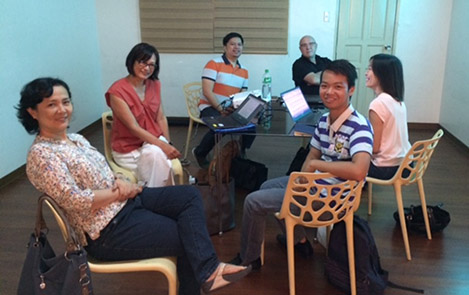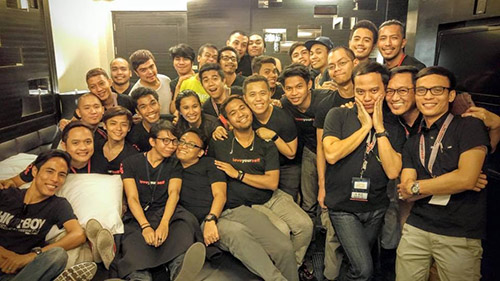In the Philippines, the HIV epidemic among men who have sex with men (MSM) has grown exponentially in recent years. MSM accounted for 82% of the country’s almost 8,000 new HIV diagnoses in 2015; and in young people aged 15−24 years, MSM have accounted for more than 82% of all infections since HIV was first identified in the Philippines in 1984.

From left, Dr. Rossana Ditangco, Dr. Ying-ru Lo, Chris Lagman, and other members of the Project PrEPPY team.
“The country’s HIV prevention efforts have so far focused on condom distribution. However, neither condoms nor lubricant are being used at adequate levels by MSM,” said Dr. Rossana Ditangco of the Research Institute for Tropical Medicine (RITM) in Manila. “Preexposure prophylaxis (PrEP) is widely accepted globally as an effective HIV prevention method, but we need more data to guide our national policy.”
Through a unique partnership between clinicians, civil society, researchers, and the World Health Organization (WHO), “Project PrEPPY” will assess the feasibility of PrEP implementation among MSM by means of a two-year pilot project in Manila, which will enroll 200 HIV-negative MSM at high risk of acquiring HIV who will receive PrEP free of charge. It is being conducted by RITM and Love Yourself, an organization that seeks to prevent the spread of HIV among youth and key affected populations through awareness, counseling, and education. amfAR is the main funder for the research component of the project, which is also supported by the WHO and the Philippines Department of Health.

Volunteers at a Love Yourself clinic
“Stigma remains a barrier to preventing HIV in the Philippines, and MSM at high risk of infection are often afraid to access services,” said Chris Lagman of Love Yourself. “Our pilot project addresses those fears by being conducted in anonymously accessible clinics and by being peer-run.” The clinics are supported by the Philippines Department of Health, which is also providing training, medical oversight, and laboratory support.
“This project represents the kind of innovative approach needed to reach stigmatized high-risk populations,” said Dr. Ying-Ru Lo, coordinator of the HIV, Hepatitis and Sexually Transmitted Infections program at the WHO’s Regional Office for the Western Pacific in Manila. “Providing PrEP, in addition to condoms and lubricant, may be an important opportunity to intensify the reach and quality of HIV prevention efforts for MSM. The Philippines is among the few countries in the Asia-Pacific region to have embarked on a PrEP program.”